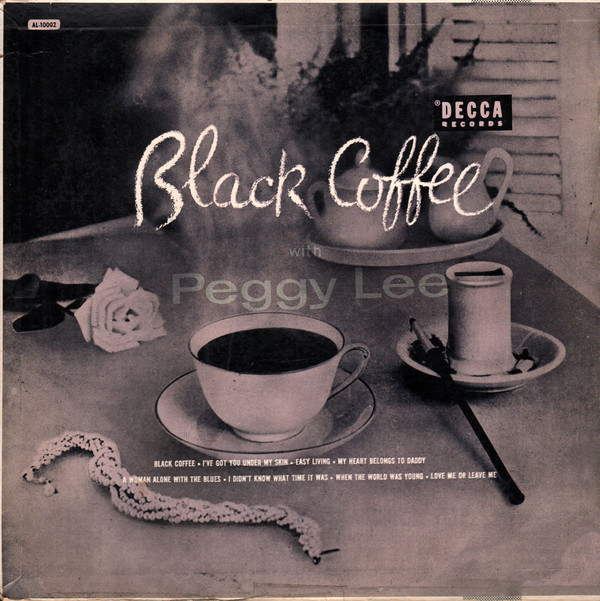Peggy Lee – Black Coffee
Released – 1953
Label – Decca
It may seem odd to say it, but Black Coffee by Peggy Lee is a collection of songs that sound exactly as you would expect them to sound, which is exactly as they should sound. The mid-fifties are preserved in amber in these songs that seem to contain the wholesome ideolised American dream and a hint of the reality of the seediness that existed but was hidden beneath the shimmering sheen presented to the world. America in the fifties was not the wholesome soda fountain world it now seems to be fondly remembered as problems that still exist today, where even deeper-seated then, and not even seen as being a problem.
I have always thought of Peggy Lee as being old but she was 33 at the time of recording this album, 20 years younger than I am today and when I clear my misguided pre-conceptions and listen to the songs as though it were a woman in her thirties singing them it all makes much more sense to me. This was her first album, having previously been part of the Benny Goodman Orchestr since 1941 and, as was the standard practice at the time, the songs are all written by somebody else, often having already been performed on record by many other artist with the Cole Porter song ‘I’ve Got You Under My Skin’ being a good example.
Interestingly, to me at least, Joni Mitchell declared the album one of her favorites, leading off her torch song album of 2000, Both Sides Now, with her version of Black Coffee.
What is certainly true is that there is much more to Lee than just the song Fever!

Tracklist
Black Coffee
I’ve Got You Under My Skin
Easy Living
My Heart Belongs To Daddy
A Woman Alone With The Blues
I Didn’t Know What Time It Was
When The World Was Young
Love Me Or Leave Me
10 Interesting Facts About Peggy Lee and Black Coffee
About Peggy Lee:
- From Humble Beginnings to Stardom
Born Norma Deloris Egstrom in North Dakota in 1920, Peggy Lee overcame a tough childhood to become one of the most celebrated vocalists of her time. She started as a radio singer before being discovered by bandleader Benny Goodman, which launched her career in the 1940s. - A Versatile Talent
Peggy Lee wasn’t just a singer—she was also a songwriter, actress, and composer. She co-wrote many of her own songs and even helped write the soundtrack for Disney’s Lady and the Tramp (1955), voicing multiple characters. - A Sultry, Subtle Style
Unlike some of her powerhouse contemporaries, Lee’s style was intimate and understated. She had an ability to “sing softly but with intensity,” making her voice hypnotic and deeply emotional. - Battling Industry Stereotypes
As a female artist in a male-dominated industry, Peggy Lee fought for creative control. She was one of the first singers to demand ownership of her master recordings, paving the way for future artists. - Influencing Future Generations
Artists like Madonna, Billie Eilish, and Norah Jones have cited Lee as an influence. Her ability to blend jazz, pop, and blues with cool sophistication made her a trailblazer.
About Black Coffee (1953):
- Her First Full Jazz Album
Black Coffee was Peggy Lee’s first album recorded in the LP format, marking a shift from her earlier pop-oriented releases. It showcased her deep connection to jazz and blues. - A Darker, More Mature Sound
Unlike the upbeat pop tunes she was known for, Black Coffee featured moody, late-night jazz with themes of love, longing, and loneliness. The slow-burning arrangements and torch-song delivery gave it a sophisticated, noir-like quality. - Minimalist Instrumentation, Maximum Impact
The album’s instrumentation was sparse yet effective, featuring trumpet, bass, drums, and piano. This allowed Peggy Lee’s voice to take center stage, creating an intimate and hypnotic experience. - Expanded in 1956
Originally released as an eight-track 10-inch LP in 1953, Black Coffee was reissued in 1956 with four additional tracks, including the now-classic “It’s a Good Day” and “My Heart Belongs to Daddy.” - A Timeless Classic
Black Coffee is now regarded as one of the greatest vocal jazz albums of all time. It remains a touchstone for jazz singers and continues to influence modern vocalists with its cool, smoky elegance.

Leave a Reply